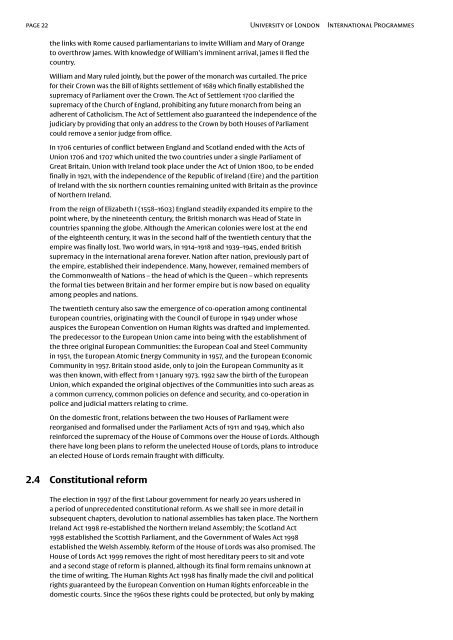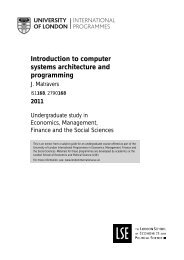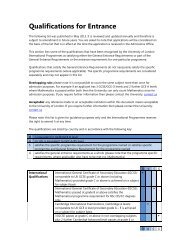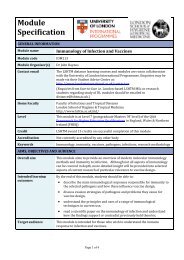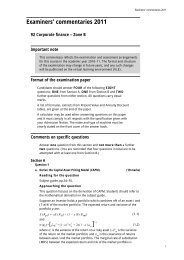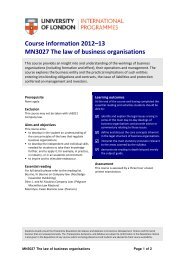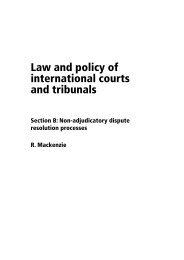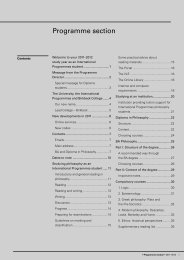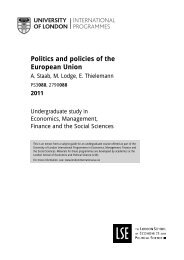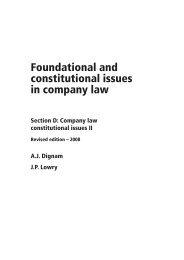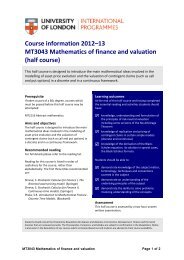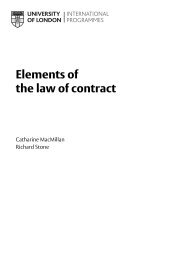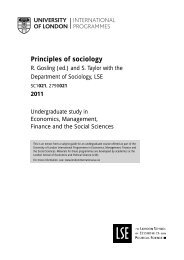Public law - University of London International Programmes
Public law - University of London International Programmes
Public law - University of London International Programmes
You also want an ePaper? Increase the reach of your titles
YUMPU automatically turns print PDFs into web optimized ePapers that Google loves.
page 22 <strong>University</strong> <strong>of</strong> <strong>London</strong> <strong>International</strong> <strong>Programmes</strong><br />
the links with Rome caused parliamentarians to invite William and Mary <strong>of</strong> Orange<br />
to overthrow James. With knowledge <strong>of</strong> William’s imminent arrival, James II fled the<br />
country.<br />
William and Mary ruled jointly, but the power <strong>of</strong> the monarch was curtailed. The price<br />
for their Crown was the Bill <strong>of</strong> Rights settlement <strong>of</strong> 1689 which finally established the<br />
supremacy <strong>of</strong> Parliament over the Crown. The Act <strong>of</strong> Settlement 1700 clarified the<br />
supremacy <strong>of</strong> the Church <strong>of</strong> England, prohibiting any future monarch from being an<br />
adherent <strong>of</strong> Catholicism. The Act <strong>of</strong> Settlement also guaranteed the independence <strong>of</strong> the<br />
judiciary by providing that only an address to the Crown by both Houses <strong>of</strong> Parliament<br />
could remove a senior judge from <strong>of</strong>fice.<br />
In 1706 centuries <strong>of</strong> conflict between England and Scotland ended with the Acts <strong>of</strong><br />
Union 1706 and 1707 which united the two countries under a single Parliament <strong>of</strong><br />
Great Britain. Union with Ireland took place under the Act <strong>of</strong> Union 1800, to be ended<br />
finally in 1921, with the independence <strong>of</strong> the Republic <strong>of</strong> Ireland (Eire) and the partition<br />
<strong>of</strong> Ireland with the six northern counties remaining united with Britain as the province<br />
<strong>of</strong> Northern Ireland.<br />
From the reign <strong>of</strong> Elizabeth I (1558–1603) England steadily expanded its empire to the<br />
point where, by the nineteenth century, the British monarch was Head <strong>of</strong> State in<br />
countries spanning the globe. Although the American colonies were lost at the end<br />
<strong>of</strong> the eighteenth century, it was in the second half <strong>of</strong> the twentieth century that the<br />
empire was finally lost. Two world wars, in 1914–1918 and 1939–1945, ended British<br />
supremacy in the international arena forever. Nation after nation, previously part <strong>of</strong><br />
the empire, established their independence. Many, however, remained members <strong>of</strong><br />
the Commonwealth <strong>of</strong> Nations – the head <strong>of</strong> which is the Queen – which represents<br />
the formal ties between Britain and her former empire but is now based on equality<br />
among peoples and nations.<br />
The twentieth century also saw the emergence <strong>of</strong> co-operation among continental<br />
European countries, originating with the Council <strong>of</strong> Europe in 1949 under whose<br />
auspices the European Convention on Human Rights was drafted and implemented.<br />
The predecessor to the European Union came into being with the establishment <strong>of</strong><br />
the three original European Communities: the European Coal and Steel Community<br />
in 1951, the European Atomic Energy Community in 1957, and the European Economic<br />
Community in 1957. Britain stood aside, only to join the European Community as it<br />
was then known, with effect from 1 January 1973. 1992 saw the birth <strong>of</strong> the European<br />
Union, which expanded the original objectives <strong>of</strong> the Communities into such areas as<br />
a common currency, common policies on defence and security, and co-operation in<br />
police and judicial matters relating to crime.<br />
On the domestic front, relations between the two Houses <strong>of</strong> Parliament were<br />
reorganised and formalised under the Parliament Acts <strong>of</strong> 1911 and 1949, which also<br />
reinforced the supremacy <strong>of</strong> the House <strong>of</strong> Commons over the House <strong>of</strong> Lords. Although<br />
there have long been plans to reform the unelected House <strong>of</strong> Lords, plans to introduce<br />
an elected House <strong>of</strong> Lords remain fraught with difficulty.<br />
2.4 Constitutional reform<br />
The election in 1997 <strong>of</strong> the first Labour government for nearly 20 years ushered in<br />
a period <strong>of</strong> unprecedented constitutional reform. As we shall see in more detail in<br />
subsequent chapters, devolution to national assemblies has taken place. The Northern<br />
Ireland Act 1998 re-established the Northern Ireland Assembly; the Scotland Act<br />
1998 established the Scottish Parliament, and the Government <strong>of</strong> Wales Act 1998<br />
established the Welsh Assembly. Reform <strong>of</strong> the House <strong>of</strong> Lords was also promised. The<br />
House <strong>of</strong> Lords Act 1999 removes the right <strong>of</strong> most hereditary peers to sit and vote<br />
and a second stage <strong>of</strong> reform is planned, although its final form remains unknown at<br />
the time <strong>of</strong> writing. The Human Rights Act 1998 has finally made the civil and political<br />
rights guaranteed by the European Convention on Human Rights enforceable in the<br />
domestic courts. Since the 1960s these rights could be protected, but only by making


